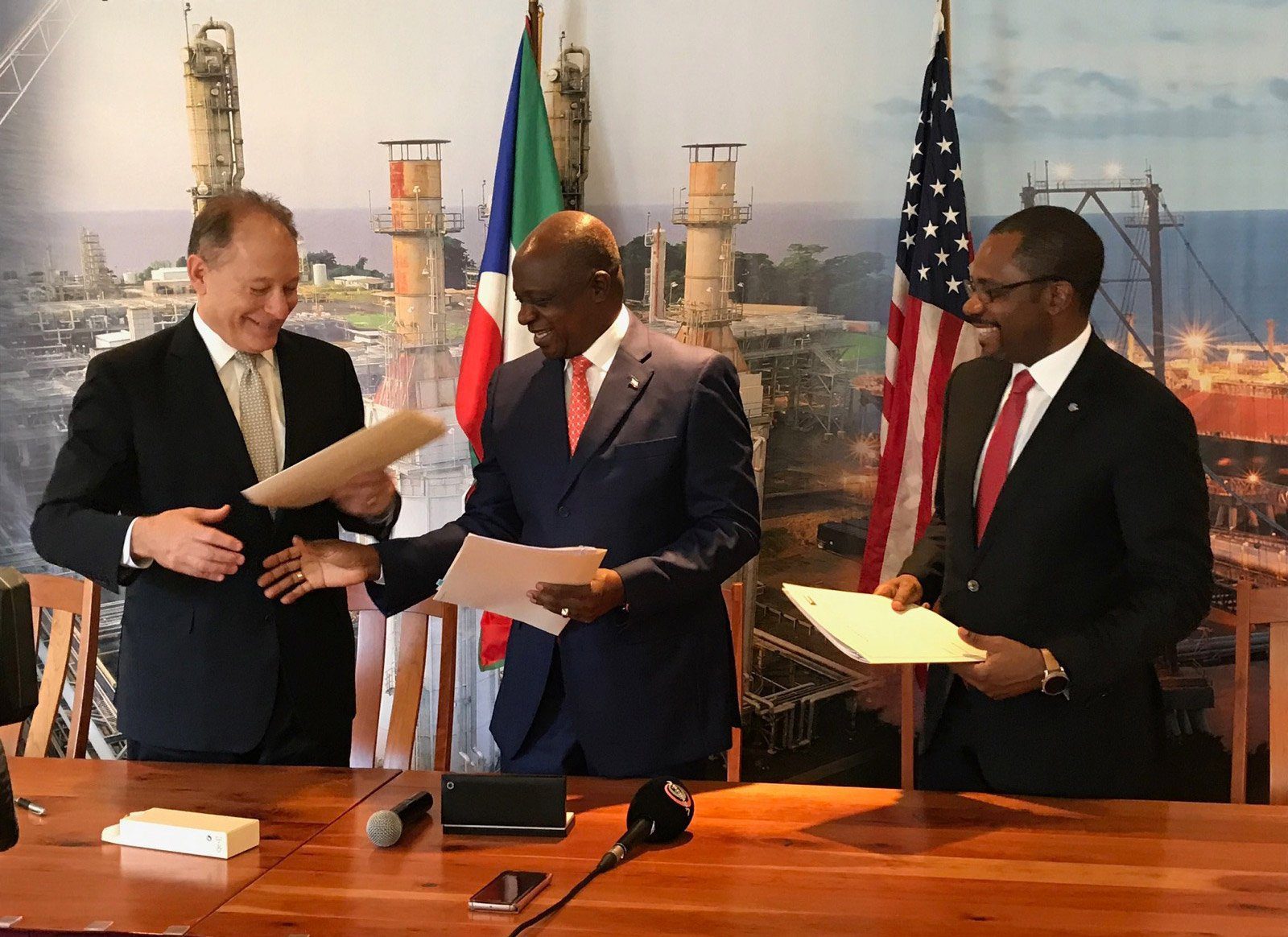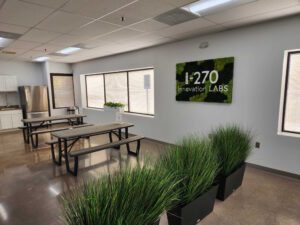
Rockville, Maryland’s Sanaria at Center of an Unlikely Global Health Success Story
In 2009, a remarkable partnership started with an unsolicited email and a “cold call.”
Ten years later, Rockville, Maryland’s Sanaria and the Bioko Island Malaria Elimination Project (BIMEP) consortium won the P3 Impact Award from a pool of nearly 2,000 applicants, marking a milestone for a unique and remarkable global health consortium that’s turning the tide in the global fight against malaria.
BIMEP, which is the fusion of two impactful malaria programs, started its mitigation efforts in Equatorial Guinea’s (EG) Bioko Island in 2004. Since that time, “BIMEP has succeeded in reducing the rate of transmission of malaria by mosquitoes on Bioko Island by 99%, reducing the prevalence of malaria infection in children 2-14 years old by 76%, and reducing all-cause mortality among children under 5, largely attributable to malaria, by 63%,” according to Sanaria’s website.
The award, which was bestowed at the 2019 Concordia Summit held in New York City at the time of the UN General Assembly, was the latest achievement of the collaboration between Sanaria, Medical Care Development International (MCDI), the government of EG, Marathon Oil, Noble Energy, the Atlantic Methanol Production Company (AMPCO) and a host of other public, private and leading scientific subject matter expert partners. The Concordia Foundation, the University of Virginia’s Darden School of Business in Society, and the U.S. Department of State’s Office of Global Partnerships created the P3 Impact Award to honor leading public-private partnerships that improve communities and the world.
“The P3 Award is an indication of how far this partnership has come. It’s an amazing amalgamation — it’s like a dream of what global health is supposed to be but rarely is,” stated Dr. Stephen L. Hoffman, CEO and Chief Scientific Officer of Sanaria.
And it all started back in 2009 when Dr. Peter Billingsley, now the Vice President of International Projects and Strategy at Sanaria, read an article about Marathon Oil’s support of a malaria control project, the Bioko Island Malaria Control Program (BIMCP) on Bioko Island where the capital of EG, Malabo, is located.
“At some point after Peter’s outreach, the Vice President of Corporate Social Responsibility and Chief Medical Officer of Marathon Oil were in Washington, D.C. for a meeting and Peter and I met with them. We talked to them about what we were doing and our vision,” stated Hoffman.
Around that time Sanaria had just started its first malaria vaccine clinical trial but “…at this point we hadn’t protected a single person with our vaccine. Marathon Oil realized that without an effective malaria vaccine, they would have to stay supporting the malaria control program in EG forever. There was no end game. If they stopped, malaria would come back, probably worse than before because people would have lost immunity. They were intrigued by our vaccine program and we hit it off personally,” he added.
Hoffman was subsequently invited by Marathon Oil to attend a Technical Advisory Group meeting of the BIMCP, which at that point had made dramatic progress across a number of key malaria control indicators. Hoffman traveled to Malabo and gave a presentation on Sanaria’s capabilities and vision.
Thus began Sanaria’s long-standing and successful collaboration with the government of EG through the leadership of the Ministry of Mines and Hydrocarbons (MMH) and the Ministry of Health and Social Welfare (MHSW), Marathon Oil, Noble Energy, and AMPCO, plus other groups that now make up the BIMEP consortium.
Hoffman and the Sanaria team’s earliest contribution to what would eventually become BIMEP was creating an African Physician-Scientist Advisory Committee that included leading malaria subject matter experts from Tanzania, Mali, and Ghana. Sanaria then went on to involve European-based malaria experts as well as malaria scientific thought-leaders from the University of Maryland and the NIH in the U.S. From there, Hoffman and Sanaria began building relationships between EG, Tanzania and Mali.
At the time EG had never conducted biomedical research in its history and therefore lacked the regulatory, ethical review and supply chain infrastructure, plus the human resources to conduct malaria vaccine clinical trials.
Hoffman and the Sanaria team worked closely with the World Health Organization (WHO), the African Vaccine Regulatory Forum (AVAREF), the government of EG, research and regulatory agencies in Tanzania, including the Tanzanian FDA and the Ifakara Health Institute (IHI) in Tanzania, and others. Together, the group would build the infrastructure and hire the staff to conduct malaria trials in EG that was safe and compliant with international standards.
“You have to have a national Ethical Review Committee, you have to have a way to import investigational drug clinical products and train pharmaceutical staff. None of this existed in EG at the time. It really was an amazing project,” stated Hoffman.
By around 2013, key pieces were starting falling into place. Marathon Oil, Noble Energy, AMPCO and the EG government were now receptive to moving ahead with the country’s very first malaria clinical trial. Sanaria met with leaders from the Swiss Tropical Public Health Institute, IHI and the EG’s Minister of Health and Social Welfare to plan the trial, which by this time had become a trans-African and global collaboration. The collaboration now included EG’s MHSW and MMH, Sanaria, IHI, Silver Spring, Maryland’s MCDI, The Swiss Tropical and Public Health Institute, Marathon Oil, Noble Energy, and AMPCO.
The group formed the Equatoguinean Malaria Vaccine Initiative (EGMVI) in 2013 to “…to test the safety and protective efficacy of whole sporozoite (SPZ) malaria vaccines in Equatorial Guinea aimed at controlling Plasmodium falciparum (Pf), the deadliest of the five malaria parasites infecting humans and by far the most prevalent malaria parasite on Bioko Island,” according to MCDI’s website.
Since 2013, Sanaria and its collaborators in this consortium have gone on to jointly conduct three successful clinical trials of Sanaria’s PfSPZ malaria vaccines in EG, a major community malaria incidence study in EG and 2 clinical trials of PfSPZ Vaccine in Tanzania.
Most recently, the entire team was preparing to start a critical Phase 3 trial of Sanaria’s PfSPZ Vaccine in June 2020 with 2,100 participants; that study has now been delayed by the COVID-19 pandemic. While preparing for the Phase 3 clinical trial in EG in January 2020, Sanaria and its partners found themselves suddenly on the front lines of the country’s COVID-19 fight. After the genome sequence of the coronavirus was released into the public domain, the consortium led by the Swiss TPH and IHI teams began developing a PCR (polymerase chain reaction) diagnostic test for SARS-Cov-2 that could be run in the laboratory that was set up to conduct malaria diagnosis for the PfSPZ vaccine trials. The first test was run at the end of January; not only was it the first such test in EG, but it is also likely the first in Africa. They subsequently have diagnosed more than 300 cases.
Sanaria, headquartered in the heart of the BioHealth Capital Region (BCHR), has spent more than a decade addressing the challenges of production, purification, cryopreservation, delivery, and administration of PfSPZ, and has an extensive domestic and international patent portfolio covering these innovations. Sanaria’s primary mission is to develop and commercialize vaccines that confer high-level, long-lasting protection against Pf, the malaria parasite responsible for more than 95% of malaria associated severe illness and death world-wide, and the malaria parasite for which there is the most significant drug resistance. The company’s overall mission includes developing vaccines that prevent all human malaria.
While the coronavirus is understandably on everyone’s mind, it’s important to remember that malaria and other diseases remain major global health threats. In 2018 alone there were 405,000 deaths from malaria globally. Approximately 85% of 2018 global malaria deaths, or 380,000, occurred in Africa (Source: WHO) and it is estimated that financial losses related to malaria may be as high $90B annually on the continent.
To date, Sanaria, in close partnership with Protein Potential, a separate but closely aligned research and development group, has conducted 35 clinical studies of PfSPZ products across the globe, safely administering 7,485 injections to 2,709 participants from 5 months to 65 years of age. There have been no allergic reactions to PfSPZ products and they have an excellent safety and tolerability profile. Importantly, significant protection against malaria has been established in more than 15 clinical trials in the U.S., Germany and multiple African countries.
Sanaria’s regulatory strategy is founded upon obtaining licensure for its PfSPZ Vaccine in the U.S. and Europe first. The company will then pursue regulatory approval in EG, Tanzania, Mali and then other African countries, as well as in Asia. Post licensure, Sanaria will commercialize its vaccine and implement it with a particular focus “…on administering PfSPZ Vaccine to individuals and communities for personal protection and focal elimination respectively, as well as improving the potency and decreasing the cost of goods by developing second and third generation PfSPZ-based malaria vaccines.”
In April 2019, Sanaria received $22M in funding from the Republic of EG and its oil and gas company partners as well as an additional $4.5M from the government of EG to support the company’s vaccine efforts. These funds are in addition to $48M in funding previously provided to the Equatoguinean Malaria Vaccine Initiative.
While Sanaria and BIMEP’s malaria trials are currently on hold due to the pandemic, Sanaria and Protein Potential, which is led by Hoffman’s spouse, Dr. Kim Lee Sim, have pivoted to helping in the fight against the coronavirus.
Sanaria and Protein Potential are planning research to establish best use of immunological testing against SARS-CoV-2 to keep their companies running, how to manage COVID-19 control programs in Africa, conduct clinical trials of malaria and diarrheal disease vaccines in the face of COVID-19, and to study the interactions between malaria and COVID-19. This will involve multiple partners from the U.S., Germany and several African countries, including EG.
In addition, the two companies are in the early stages of developing their own COVID-19 vaccine and have been working with SAb Biotherapeutics, Inc. to develop strategies for testing the efficacy against COVID-19 of SAbⓇ human antibodies against SARS-Cov-2. The potential COVID-19 therapeutic is called SAb-185. Sab-185 is produced in cattle genetically modified with human DNA to produce human antibodies in large quantities that can then be purified for use as a therapy for COVID-19 patients.
While Sanaria and Protein Potential have temporarily changed course to fight COVID-19, Sanaria’s main focus will remain on malaria vaccine development and commercialization. Protein Potential, which has a long history in vaccine research, will keep moving forward with developing vaccines for diarrheal diseases and typhoid fever. These complementary focus areas dovetail to form a pipeline with tremendous potential to relieve traveler pain points like ETEC, or traveler’s diarrhea, and malaria, and most importantly diseases that devastate the most underserved populations of our world.
The ultimate goal for Sanaria is eradication of malaria from the planet.
What started as a shot in the dark, cold call from Sanaria, then an upstart, emerging BHCR company, has evolved into truly remarkable global health collaboration that has the potential to fundamentally change the world for the better.
The end of this unlikely global health partnership’s story has yet to be written.
However, if Sanaria and the BIMEP consortium have their say, the story would end with hundreds of thousands of lives being saved from malaria every year.
- About the Author
- Latest Posts
Steve brings nearly twenty years of experience in marketing and content creation to the WorkForce Genetics team. He loves writing engaging content and working with partners, companies, and individuals to share their unique stories and showcase their work. Steve holds a BA in English from Providence College and an MA in American Literature from Montclair State University. He lives in Frederick, Maryland with his wife, two sons, and the family dog.





